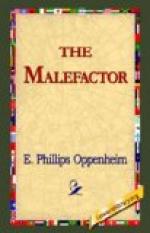“I rather fancied,” he remarked, “that up to now—”
“Yes! Of course!” she interrupted, “you saved me from ruin, staved it off at any rate. And you held over the reckoning! I—I almost wish—”
She paused. Again her eyes were searching his.
“I am a little tired of it all, you see,” she continued. “I don’t suppose Lumley and I can ever be the same again since I brought him—that check. He avoids being alone with me—I do the same with him. One would think—to watch the people, that the whole transaction was in the Morning Post. They smile when they see us together, they grin when they see you with anybody else. It’s getting hateful, Wingrave!”
“I am afraid,” he said quietly, “that you are in a nervous, hypersensitive state. No one else can possibly know of the little transaction between us, and, so far as I am concerned, there has been nothing to interfere with your relations with your husband.”
“You are right,” she answered, “I am losing my nerve. I am only afraid that I am losing something else. I haven’t an ounce of battle left in me. I feel that I should like to close my eyes and wake up in a new world, and start all over again.”
“It is nothing but a mood,” he assured her. “Those new worlds don’t exist any longer. They generally consist of foreign watering places where the sheep and the goats house together now and then. I think I should play the game out, Lady Ruth, until—”
“Until what?”
“Perhaps to the end,” he answered. “Who can tell? Not I! By this time tomorrow, it might be I who would be reminding you—”
“Yes?”
“That there are other worlds, and other lives to live!”
“I should like,” she whispered very softly, “to hear of them. But I fancy somehow that you will never be my instructor. What of your ward?”
“Well! What of her?” he answered calmly.
She shivered a little.
“You were very frank with me once, Wingrave,” she said. “You are a man whose life fate has wrecked, fate and I! You have no heart left, no feeling. You can create suffering and find it amusing. I am beginning to realize that.”
He nodded.
“There is some truth,” he declared, “In what you say.”
“What of that child? Is she, too, to be a victim?”
“I trust,” he answered, “that you are not going to be melodramatic.”
“I don’t call it that. I really want to know. I should like to warn her.”
“I am not at war with children,” he answered. “Her life and mine are as far apart as the poles.”
“I had an odd fancy when I saw you with her,” Lady Ruth said slowly. “She is very good-looking—and not so absurdly young.”
“The fancy was one,” he remarked coldly, “which I think you had better get rid of.”
“In a way,” she continued thoughtfully, “I should like to get rid of it, and yet—how old are you, Wingrave? Well, I know. You are very little over forty. You are barely in the prime of life, you are strong, you have the one thing which society today counts almost divine—great, immeasurable wealth! Can’t you find someone to thaw the snows?”




